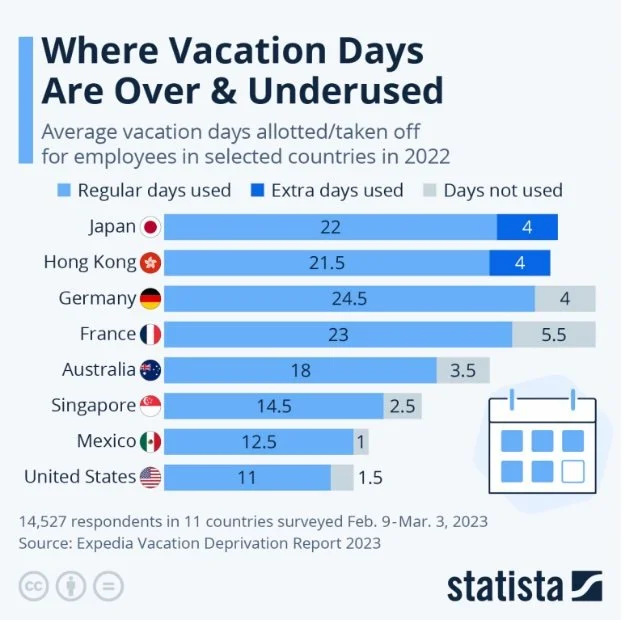Labor shortage in Japan and what that means for you Part 3: Workplace culture shift
With Obon approaching, it feels like the perfect moment to reflect on how Japanese workers are using their paid time off. According to the Expedia Vacation Deprivation Report, Japanese employees took an average of 22 regular vacation days and 4 additional days in 2022, placing them among the highest globally in terms of days taken, at least according to the accompanying graph. On the surface, this might suggest a healthy work-life balance. But the reality is more nuanced.
To be honest, I was surprised by the reported number of vacation days taken by Japanese employees. Until recently, most data I came across suggested that workers in Japan rarely used all their allotted time off—let alone requested extra days. This also aligns with my own experience in a Japanese office, where there was a quiet but persistent pressure to be physically present. Taking time off often came with a sense of guilt, followed by apologies and boxes of omiyage upon returning to work.
What could this change mean?
The apparent increase in vacation days may signal a subtle but meaningful shift in workplace culture. While the traditional emphasis on presence and loyalty remains strong, especially in more conservative industries, there are signs that younger generations and global influences are reshaping norms around rest and personal time.
The quiet pressure to always be in the office may be slowly giving way to a more balanced view of work and well-being. If employees are indeed taking more of their allotted days, it could reflect a growing awareness of burnout and the importance of mental health, even in a culture that historically values endurance and group harmony. That said, the uptick in vacation usage might also be a response to increased workloads. In some companies, it’s common practice to use paid time off (PTO) instead of designated sick days, suggesting that the additional time off may not always be restful.
For those working in Japan or with Japanese teams, this shift could mean greater openness to flexible work arrangements, remote collaboration, and even conversations around work-life balance. However, navigating these changes still requires cultural sensitivity. Values like diligence, respect, and humility remain deeply embedded, and expectations can vary widely depending on the company and region.
Japan’s labor shortage adds another layer to this dynamic. With fewer workers available, companies may be forced to rethink how they retain talent, not just through salary, but through workplace culture. Encouraging employees to actually use their vacation days could be part of a broader strategy to improve job satisfaction and reduce turnover.
What does this mean for you?
If you are interested in working for a Japanese company abroad or in Japan itself, and especially if you speak some Japanese, this means you have a better position on the job market than ever before. If you want to prepare for such a job, why not get some additional training!
Want to know more? At Japan Consulting Office, we specialize in equipping professionals to thrive in cross-cultural environments. Whether you’re looking for group training or one-on-one sessions, we’ve got you covered!
If you want to learn more about bridging language and cultural gaps in Japanese business, why not join one of our sessions! Here’s the link to upcoming sessions (make sure to select your timezone


